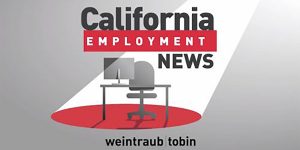 Two of the most common pay exemptions from federal and state overtime, meal and rest break, and minimum wage laws are the Professional and Administrative exemptions. Meagan Bainbridge and Lukas Clary detail how these two exemptions work in this episode of California Employment News.
Two of the most common pay exemptions from federal and state overtime, meal and rest break, and minimum wage laws are the Professional and Administrative exemptions. Meagan Bainbridge and Lukas Clary detail how these two exemptions work in this episode of California Employment News.
Watch this episode on the Weintraub YouTube channel here.
Show Notes:
LUKAS:
Hello, everyone. Thank you for joining us for this installment of the California Employment News, an informative video and podcast resource offered by the labor and Employment Group at Weintraub Tobin. My name is Lukas Clary, and I’m a shareholder in the firm’s labor and employment group. I am joined today by my partner, Meagan Bainbridge. Today we are going to continue our series on exemptions, and we’ll be discussing a couple of the most common ones from federal and state overtime, meal and rest break and minimum wage laws. Those are the professional and administrative exemptions. Meagan, let’s start with the administrative exemption. What can you tell us about that?
MEAGAN:
Thanks, Lukas. The administrative exemption is one of the so-called white-collar exemptions. To qualify for the administrative exemption, a California employer must show that the employee’s primary duty is office or non-manual work. And this generally doesn’t mean clerical work that they directly relate to the management and general business operations of the employer or the employer’s customers, and includes the exercise of discretion and independent judgment with respect to matters of significance. In addition to these requirements, an exempt administrative employee must be primarily engaged in, which means more than 50% of the time, one of the following duties that could be regularly and directly assisting a proprietor or an employee who is employed in a bona fide executive or administrative capacity performing specialized or technical work under only general supervision. That require special training or experience or knowledge or three, executing special assignments or tasks under only general supervision. Often, these types of roles are going to be related to human resources, accounting, quality control, maybe payroll or benefits management, and possibly even marketing positions. Lukas, what can you tell us about the professional exemption?
LUKAS:
Right, so, the professional exemption can apply to employees who meet all of these requirements. First, they either must be licensed or certified by the State of California and primarily engaged in the practice of one of the following professions law, medicine, dentistry, optometry architecture, engineering, teaching, or accounting. Or in the absence of that, they must be primarily engaged in a quote, learned or artistic profession. This means they are performing work that either requires knowledge of an advanced type in a field of science or learning customarily acquired through prolonged and specialized study. So think master’s and doctorate degree level stuff, rather than skill gained through general education or training in the performance of routine processes. Or a third way, they must be performing work that is original and creative in character in a recognized field of artistic endeavor, the result of which primarily depends on invention, imagination, or talent of the employee. For the artistic professional exemption to apply, the work being performed must also be predominantly intellectual and varied in character. Think something that cannot be easily replicated in a short period of time, something that takes time and talent. Now, whether someone is a licensed, learned, or artistic professional, some other criteria must be met for all three.
So first, they must also earn a minimum salary of at least $1,240 per week, which translates to $64,480 per year. And that number is determined based on being double the minimum wage for a full-time employee, so it could go up at minimum wage increases in future years. Second, they must, like the administrative exemption that Meagan discussed, must customarily and regularly exercise discretion and independent judgment in performing their job. So that is the professional exemption.
MEAGAN:
Thanks, Lukas. Well, that’s it for now. In our next episode, we’ll complete our examination of the exemptions under the FLSA and California Labor code by concentrating on the lesser known and utilized exemptions, including those for sales, employees and the computer professional. You can continue to find us on our blog at theleblog.com or wherever you listen to your favorite podcasts. Thank you for joining us today, and we look forward to seeing you next time on the California Employment News.
Podcast: Play in new window | Download